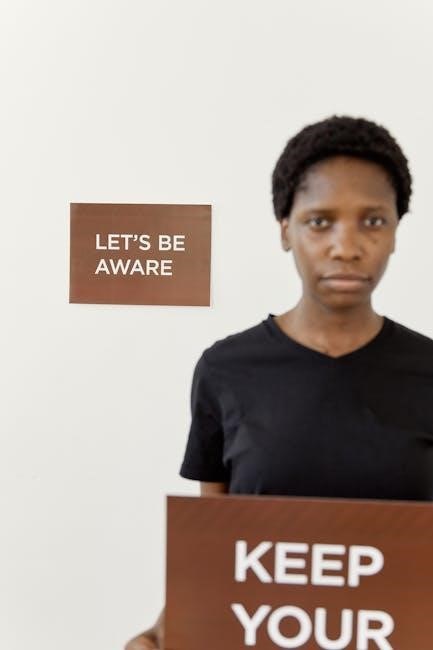The Concept of Conscience as a Moral Guide
Conscience is a faculty of the mind that motivates us to act morally‚ guiding our actions according to deeply held values and principles․ It serves as an internal moral compass‚ helping individuals discern right from wrong and make ethical decisions․ Conscience is often described as a private‚ intuitive experience that reflects self-knowledge and personal moral beliefs․ While it is shaped by reason‚ emotion‚ and external influences‚ its core function is to provide a sense of obligation to act virtuously․ This inner guide is essential for navigating complex moral situations and upholding personal integrity․
1․1․ Definition and Understanding of Conscience
Conscience is defined as an internal moral compass that guides individuals to act according to their deeply held values and principles․ It is a private‚ intuitive faculty of the mind that distinguishes right from wrong‚ influencing ethical decision-making․ Conscience is often described as a voice of moral judgment‚ shaped by reason‚ emotion‚ and external influences like culture and religion․ It serves as a self-aware mechanism‚ enabling individuals to reflect on their actions and intentions‚ fostering a sense of accountability and integrity․ This inner guide is rooted in personal values‚ making it a unique and subjective moral framework․

The Role of Conscience in Moral Decision-Making

Conscience serves as a moral compass‚ helping individuals distinguish right from wrong and guiding ethical actions․ It mediates between personal values and external circumstances‚ ensuring alignment with moral principles․
2․1․ Intuition‚ Emotion‚ and Reason in Conscience
Conscience integrates intuition‚ emotion‚ and reason to guide moral decision-making․ Intuition provides immediate moral insights‚ while emotion adds a feeling-based response to ethical dilemmas․ Reason‚ however‚ enables critical evaluation and refinement of these moral judgments․ Together‚ these elements create a balanced framework for discerning right from wrong․ Intuition sparks initial ethical awareness‚ emotion adds depth to moral sensitivity‚ and reason ensures decisions align with logical and ethical principles․ This harmonious interplay helps individuals navigate complex moral situations with clarity and confidence․

The Formation of Conscience
Conscience is shaped by education‚ environment‚ and personal experiences‚ forming a lifelong moral framework․ It evolves through influences like culture‚ religion‚ and societal norms‚ guiding ethical behavior․
3․1․ Education‚ Environment‚ and Personal Experiences
Conscience is profoundly shaped by education‚ environment‚ and personal experiences․ Education imparts moral values and principles‚ while the environment‚ including family and culture‚ influences ethical beliefs․ Personal experiences‚ such as significant life events‚ further refine moral understanding․ These factors collectively shape an individual’s ability to discern right from wrong‚ fostering a well-formed conscience․ Additionally‚ the integration of reasoning and self-reflection enhances moral awareness‚ enabling individuals to align their actions with ethical standards․ This dynamic process underscores the importance of nurturing conscience through lifelong learning and exposure to diverse perspectives․

The Reliability of Conscience as a Guide
The conscience is a reliable guide to ethical decision-making‚ but its reliability depends on proper education and scrutiny․ It helps discern right from wrong‚ though not always perfectly․
4․1․ The Importance of a Well-Formed Conscience

A well-formed conscience is essential for ethical decision-making‚ as it integrates reason‚ emotion‚ and moral principles․ It is shaped by education‚ self-reflection‚ and adherence to ethical standards‚ ensuring clarity in distinguishing right from wrong․ A well-formed conscience guides individuals to act virtuously‚ even in complex situations‚ by aligning their choices with universal moral truths․ Its development is a lifelong process‚ requiring ongoing effort to refine and align with the greater good․ Ultimately‚ it fosters integrity‚ accountability‚ and a commitment to doing what is morally just․
Challenges to Conscience as a Moral Guide
Conscience faces challenges like moral relativism‚ personal bias‚ and societal pressures‚ which can distort its ability to provide clear ethical direction․ External influences often conflict with internal moral beliefs‚ creating confusion and doubt in decision-making․
5․1․ Moral Relativism and Personal Bias
Moral relativism and personal bias pose significant challenges to conscience as a moral guide․ Relativism suggests that moral truths vary across cultures and individuals‚ undermining universal ethical standards․ Personal biases‚ shaped by upbringing and experiences‚ can distort conscience‚ leading to subjective rather than objective moral judgments․ These factors create confusion and inconsistency‚ making it difficult for individuals to discern clear moral direction․ As a result‚ conscience may become swayed by external influences rather than serving as a steadfast moral compass‚ complicating ethical decision-making in diverse contexts․
Cultural and Religious Perspectives on Conscience
Cultural and religious perspectives shape conscience‚ with many viewing it as a divine voice or societal values․ It guides moral judgment across diverse belief systems and traditions․
6․1․ Conscience as the Voice of God or Society

Conscience is often viewed as the voice of God or society‚ reflecting moral principles rooted in divine will or cultural norms․ In many religions‚ it is seen as a divine guide‚ prompting individuals to act according to God’s will․ Conversely‚ societal perspectives emphasize conscience as internalized values‚ shaping moral judgments based on collective norms․ This duality highlights its role in bridging the spiritual and social dimensions of morality‚ influencing decisions and ethical behavior across cultures and belief systems․
The Difference Between Conscience and Guilt
Conscience is an internal guide prompting moral decisions‚ whereas guilt is the emotional regret felt after acting against one’s values or principles․
7․1․ Understanding Guilt and Shame in Moral Decisions
Guilt and shame are emotions closely linked to conscience‚ influencing moral decisions․ Guilt arises from regret over specific actions that violate personal values‚ while shame reflects a negative self-perception due to perceived wrongdoing․ Both emotions serve as internal alarms‚ prompting self-reflection and behavioral change․ However‚ excessive guilt or shame can hinder moral growth by fostering self-condemnation rather than constructive action․ Recognizing these emotions helps individuals address their moral failings and align their actions with their conscience‚ fostering personal integrity and ethical behavior․

Practical Applications of Conscience in Daily Life
Conscience guides ethical choices in personal and professional contexts‚ helping individuals navigate complex situations and align actions with moral values‚ fostering integrity and ethical behavior consistently;
8․1․ Making Ethical Choices in Personal and Professional Contexts

In both personal and professional settings‚ conscience plays a pivotal role in ethical decision-making․ It helps individuals discern right from wrong‚ guiding actions that align with moral principles․ Professionally‚ conscience ensures integrity‚ encouraging transparency and fairness‚ while personally‚ it fosters honesty and compassion․ By listening to their conscience‚ people can navigate complex situations‚ balancing self-interest with the greater good․ This inner guide promotes responsible behavior‚ leading to a consistent and principled approach to life’s challenges‚ both at work and at home‚ enriching overall character and societal well-being․

The Evolution of Conscience in Modern Society
Modern society views conscience through the lens of psychology and neuroscience‚ recognizing its adaptability and influence from cultural and ethical advancements‚ reshaping traditional moral understanding․
9․1․ The Impact of Psychology and Neuroscience
Psychology and neuroscience have significantly influenced our understanding of conscience‚ revealing its roots in brain activity and emotional processes; Studies show that moral decision-making involves regions like the prefrontal cortex‚ blending intuition with rational thought․ These insights highlight conscience as a dynamic‚ evolving faculty shaped by neural interactions and psychological development․ Understanding its biological and cognitive bases helps refine ethical frameworks‚ emphasizing the importance of mental health and self-awareness in moral growth and societal progress․
The Ethical Implications of Following One’s Conscience
Following one’s conscience involves balancing personal moral principles with societal expectations‚ raising questions about individual responsibility and collective ethical standards․ It demands critical self-reflection and accountability․
10․1․ Balancing Personal Morals with Broader Societal Expectations
Balancing personal morals with societal expectations requires navigating tensions between individual ethical beliefs and collective norms․ While conscience provides a personal moral compass‚ societal expectations often demand compliance with established standards․ This balance is crucial in maintaining both individual integrity and social harmony․ It involves understanding when to adhere to personal values and when to compromise for the greater good․ Effective navigation of this balance fosters ethical decision-making that respects both personal and societal well-being‚ promoting a cohesive and morally conscious community․


